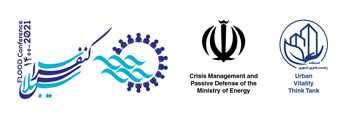- About Conference
The comprehensive conference of Flood management and Engineering (IFMC) is held annually in order to discuss and publish a wide range of issues and challenges in flooding and the latest developments and findings in this field. It provides a unique opportunity for a variety of professionals, including engineers, planners, scientists and natural and social science researchers, health professionals, crisis managers, decision makers and policymakers, to come together in order to share perspectives and experiences.
The “۸th Comprehensive Conference on Flood Control and Engineering” is planned for Fall 2021 with the approach of flooding in Iran as the other side of the draught and accordance with the integrated flood management (IFM) approach. Lessons learned from the series of specialized conferences planned and held by secretariat of this conference over the past 10 years is a valuable source that will add a richness to the upcoming “Flood Control and Engineering conference 2021”. Notable achievements are:
To reach integrated flood management, it is necessary to achieve stakeholders’ involvement in watershed issues at both horizontal and vertical levels. Participation of stakeholders at horizontal level encompasses collaboration of all national or political actors in flood management (including municipalities, provincial governments, regional water companies, water and sewage companies, agricultural Jihad Organizations, natural resources and watershed management organizations, environment protection authorities, roads and urban planning authorities, weather bureau, etc.)
Participation of stakeholders at vertical level contains cooperation of all beneficiaries (including Villagers, citizens, farmers, owners of industrial and service units, etc.) and concerned people (including researchers, specialists, NGOs, etc.) with national or political actors in flood management at the watershed scale.
In order to achieve integrated flood management, a multidisciplinary perspective of flooding and collaboration of different specialties (including water resources management, river engineering, civil, crisis management, watershed management, agriculture, urban planning and architecture, sociology, law, ecology, etc.) on the watershed scale is required.
In line with the integrate flood management, it is necessary to restore the ecological status of river networks as Blue-Green infrastructure of human settlements. Due to the historical role of rivers in livelihoods and development of ancient civilizations, planning and actions for revival of river ecosystems as the backbone for integrated flood management is necessary.
To achieve the integrated flood management, connection between cities/villages with watersheds is critical. Urban/rural planning and urban/rural design in line with regional planning should be done on the watershed scale and in close interaction with it.
In order to achieve integrated flood management, it is necessary to establish a full water cycle in the watersheds. Flood is considered as a surface water source and like other water sources should be in the correlation with water, food and energy.
- Conference Topics
Development adaptation to Floods and drought by Urban Planning and Design –
Trends and frequencies of floods and droughts in different parts of Iran –
Social Behavior in Prevention, Coping, Rehabilitation and Reconstruction against Floods and Droughts –
Consequences of flood and drought (social, environmental, economic, health, security, etc.) –
Legal Challenges of Flood and Drought Management in Iran –
Flood and drought monitoring and forecasting in Iran –
Water resources management, floods and drought in Iran –
– Training and capacity building, floods and drought in Iran –
- Conference Objectives
– Difference between meteorological drought and water bankruptcy crisis in Iran
– Characteristics of wet and dry periods, floods and droughts frequency in Iran
– Development compatible with the characteristics of floods and drought in Iran
– Issues related to floods and drought in cities and villages of Iran
- Conference Programs
۳ expert panel discussions
3 Keynote Speeches (20 minutes each speech)
10 custom national and international scientific lectures (30 minutes each lecture)
8 workshops (two-hour and four-hour workshops which are held by outstanding national and international professors)
24 oral articles (15 minutes each article)
- Important Dates
Full-Paper Submission Deadline: 22 September 2021
Late Registration Deadline: 12 October 2021
Conference Dates: 19-21 October 2021
:Important Dates
Full-Paper Submission Deadline: 22 September 2021
Late Registration Deadline: 12 October 2021
Conference Dates: 19-21 October 2021
About Conference
The comprehensive conference of Flood management and Engineering (IFMC) is held annually in order to discuss and publish a wide range of issues and challenges in flooding and the latest developments and findings in this field. It provides a unique opportunity for a variety of professionals, including engineers, planners, scientists and natural and social science researchers, health professionals, crisis managers, decision makers and policymakers, to come together in order to share perspectives and experiences.
:Contact us
Address: 798 Shariati street, Flat 7, 3/F
Tehran, Iran
POB box: 158759133
Tel: +9821-44991167
FAX: +9821-45812697
Mob.: +989032751020
Email: info@ifmc.ir
copyright © ۲۰۲۱ all rights reserved




